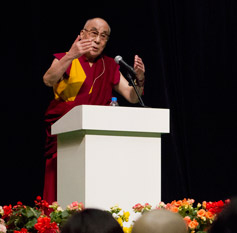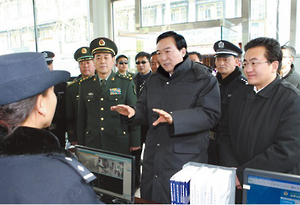
His Holiness the Dalai Lama speaking during his public talk in Tokyo, Japan on November 25.
Photo: Office of Tibet, Japan
China’s ruling Communist Party hopes to stamp out the Dalai Lama’s voice in Tibet by increasing control on media and information channels within the country. In an editorial for the Party’s journal Quishi, Chen Quanguo, a top official, called the Dalai Lama “a wolf in sheep’s clothing” and accused him of using violent methods to establish an autonomous Tibet. In order to “strike hard against the reactionary propaganda of the splittists from entering Tibet”, Quanguo suggested a higher monitoring of online content, confiscation of illegal satellite dishes, and greater measures to ensure that all telephones are registered in the users’ real names.

Tibet Party Secretary Chen Quanguo visits a “convenience police-post” in Lhasa, 2012.
Photo: China Tibet News
China has also accused the Dalai Lama, an unflinching advocate of peaceful talks and the middle path, of causing border issues between China and India. A White Paper, issued when the Indian Prime minister recently landed in Beijing for a three-day visit, wrote that the Dalai Lama’s presence in India was one of the main issues of contention between the two countries. The paper also repeated China’s stand on the Dalai Lama’s request for autonomy, stating that greater autonomy is synonymous with freedom. A month back, the Global Times, a major Chinese newspaper, expressed a similar rejection of the spiritual leader’s middle path. “The ‘Greater Tibet’ with ‘high-level autonomy’, which has been dreamed about by the Dalai Lama, is actually without the Chinese military presence and diplomatic control of the central government”, the article writes. “Then how can China exercise its ‘indisputable’ sovereignty over Tibet?”

Chinese authorities dismantled satellite dishes to disable foreign radio and TV broadcasts in Labrang, Amdo, earlier this year.
Photo: VOA
Such deeply preventive measures and unyielding stances have worried the world, as well as the Central Tibetan Administration. The White Paper issued during the Indian Prime Minister’s visit claims that 94% of adult Tibetans have voted for “local leaders”, and suggests that this is support for the Chinese government as opposed to the Dalai Lama. Yet thousands of Tibetan consistently put themselves in great personal danger in order to have pictures of the Dalai Lama in their homes and to listen to, and often attend, his teachings. “Such counter-productive measures by the Chinese government to stifle free flow of information in Tibet will only further exacerbate the resentment of Tibetans inside Tibet” said Kalon Dicki Chhoyang of the Department of Information and International Relations for the Central Tibetan Administration. China has recently sought to defend its human rights record in light of the seat it has just won on the UN Human Rights Council, a decision that was heavily protested.




 Print
Print Email
Email